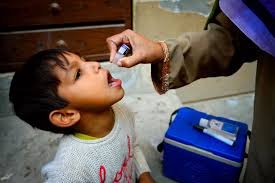The first case of poliovirus was detected in Gilgit-Baltistan in May 2025.
by Sadia Gulzar
Despite global efforts to eradicate polio, Pakistan and Afghanistan remain the last strongholds of this crippling virus. The recent detection of a polio case in Gilgit-Baltistan’s Diamer Division marks a troubling expansion of the disease into previously unaffected regions. This alarming development underscores the persistent challenges in Pakistan’s fight against polio—ranging from vaccine refusals and militant attacks on health workers to systemic healthcare failures.
While the world has nearly eliminated polio, Pakistan and Afghanistan continue to report new cases, with infections rising sharply in recent years. According to the World Health Organization (WHO), Pakistan recorded only six polio cases in 2023, but the number surged to 74 in 2024. Balochistan accounted for 27 cases, Khyber-Pakhtunkhwa (KP) for 22, Sindh for 23, and Punjab and Islamabad reported one each. In the first half of 2025, 14 new cases emerged, including the first in Gilgit-Baltistan—a region previously considered polio-free.
Security threats to workers
One of the biggest obstacles to eradication is the danger faced by vaccination teams. Health workers have been targeted in Balochistan and Khyber-Pakhtunkhwa’s tribal districts, urban centres like Karachi, and even remote regions such as Gilgit-Baltistan. In May 2025, a polio team in Diamer’s Tangir Valley—the constituency of Gilgit-Baltistan’s Chief Minister Gulbar Khan—was attacked by armed assailants who accused them of “bringing unveiled women under the pretext of vaccination.”
Also read: Cardiovascular diseases a growing health crisis in Gilgit-Baltistan
Since 2012, over 300 polio workers have been injured, and 112 killed in KP alone. In Balochistan’s Mastung district, a bomb blast targeting a police escort for a vaccination team killed nine people, including five children. Similarly, in Karachi’s Korangi district, four women and two boys were arrested for assaulting a polio team after refusing vaccination.
Vaccine refusals and misinformation
The rise in polio cases is also fuelled by widespread vaccine refusals. During April 2025 campaign, over 60,000 parents refused vaccination, with the highest refusal rates in Karachi. Misinformation plays a key role. Many believe the oral polio vaccine (OPV) causes infertility or violates religious principles.
However, this argument collapses under scrutiny: 57 Muslim-majority countries have eradicated polio without such issues. Another common misconception blames Afghan refugees for the virus’s spread, despite borders being closed and refugees residing globally, including in the US and Canada. The real issue lies in Pakistan’s weak healthcare infrastructure and mismanagement.
A report by the Independent Monitoring Board and Dawn revealed that 60% of affected children in 2024 had not received a single OPV dose. Shockingly, 4 million planned vaccinations were missed due to logistical failures and fake record-keeping. Such negligence highlights systemic corruption and poor oversight in public health campaigns.
The way forward
To combat polio, the government must ensure security for polio teams through enhanced protection; launch aggressive awareness campaigns to counter misinformation; strengthen healthcare systems to prevent missed vaccinations; engage religious leaders to endorse vaccination as safe and Islamic.
Polio eradication is not just a health priority—it is a national emergency. Without urgent action, Pakistan risks reversing decades of progress, leaving future generations vulnerable to a preventable disease. The time to act is now.

Sadia Gulzar, a dedicated nursing student from Gilgit-Baltistan’s Yasin Valley, is currently pursuing her BScN at Ziauddin University, Karachi. Passionate about health advocacy, she writes on critical medical issues to raise awareness and promote wellness in underserved communities.

The High Asia Herald is a member of High Asia Media Group — a window to High Asia and Central Asia

